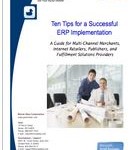Avoid These 4 ERP Implementation Mistakes
Are you adding an ERP (enterprise resource planning) system to your business (or maybe changing to another?). Here are 4 mistakes that can plague an ERP implementation, and tips to help stay focused for success.
No Objectives / Management Support
Unless you have the backing of management, you’ll be set up to fail from the start. Management must communicate the importance of this change, announce the key players involved, and the benefits the company will achieve once the move to a new system is complete.
No Responsible Personnel / Schedule Planned
If you don’t identify objectives and a list of tasks to be completed, an individual to be responsible for them, priorities, and a schedule for meeting them, your project risks failure.
Identify your objectives and tasks, and assign a unique priority to each task. Identify individuals responsible for each task, and assign those responsibilities to each of them. Make a schedule for the project that includes a realistic Go-Live date, each task, and 25% for unexpected work or delays. Identify deadlines and make clear the consequence of not meeting those deadlines. Avoid miscommunication by assigning one person to communicate between all parties involved. Don’t forget to leave the lines of communication open with your vendor’s Implementation Team.
No Acceptance / Appropriate Training
Your staff must know why some of their jobs will require new procedures or responsibilities, and why some old tasks will no longer necessary. Help them understand the benefits of the new system, both to them and to the company. Before implementation, give them time to accept the new system and become comfortable with it. As the project moves through various phases, communicate the progress. This will help employees feel they are part of the change and accept their tasks.
If you don’t provide adequate training, users may revert to old methods or incorrect procedures. This includes manager training.
Adequate training means the knowledge and support of your system is in the hands of qualified users. It allows everyone to visualize the new system in action and to interact with it. Make sure everyone involved knows the processes, their responsibilities in those processes, and how to accomplish them with the new system.
No Testing/Not Enough Testing
Each type of transaction should be followed through the system in detail by representatives from each department involved to be sure everyone is familiar with the transaction flow and that all of the steps are followed and understood. Additionally, several weeks of parallel testing is recommended so everyone knows their new responsibilities and questions/issues can be addressed. This will go a long way in gaining your staff’s confidence that you, and they, are prepared for Go-Live.
 When it’s time to think about your ERP system, give us a call. Morse Data is committed to continuous improvement. Changes can get out of line, but we help get them InOrder.
When it’s time to think about your ERP system, give us a call. Morse Data is committed to continuous improvement. Changes can get out of line, but we help get them InOrder.






No Comments